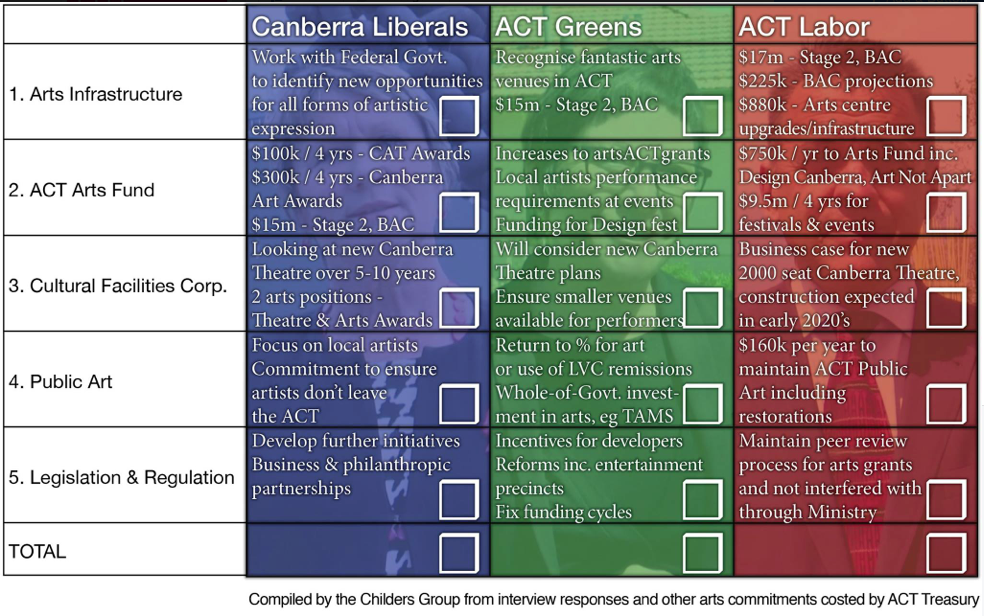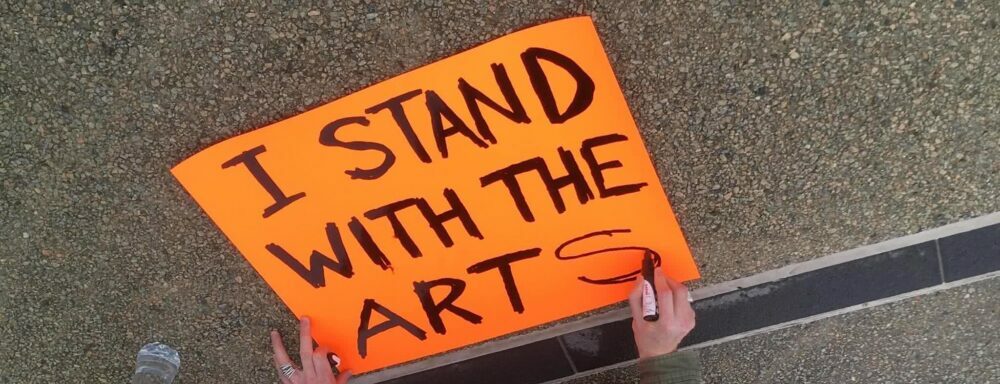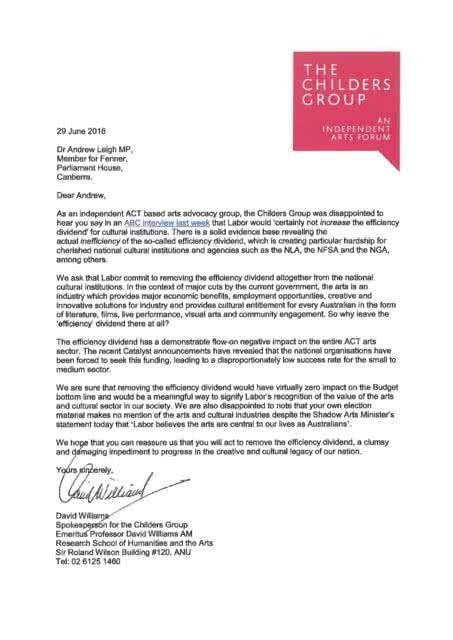The Childers Group coordinator, Jack Lloyd, posed 5 questions to 3 of the potential candidates for the Arts portfolio in the ACT. See their responses on our public Facebook page. It’s great to see arts and culture being thought about, discussed, passionately defended, and ideas flying about in social media and in the news. Go to www.facebook.com/ChildersGroup/ to join the discussion, and you can read a summary below.
Take a closer look – ACT Arts Grants, 2003 to 2015
The Childers Group thought it was time to re-share this info to sharpen our focus as we lead up to the ACT Election. (Bravo and a big thank you to Jack Lloyd for this work.)
The Childers Group put together an analysis of the past 12 years of arts grants in the ACT and the trends within different funding types. This analysis shows that over this time, stretching over three full electoral cycles, there has been a significant decline in ACT arts grants on a per capita basis, and as a proportion of funds available to Government.
This analysis is drawn from over 1,500 grant entries in ACT Government annual reports, copied and sorted by grant type.
Some of our conclusions at this stage:
- On a per-capita basis, adjusted for inflation, total grant funded arts activity has decreased from $24.79 in 2004-05 to $22.30 in 2015-16, or by 10%
- If 2015-16 activity were funded at 2004-05 per capita rates, total grants would be increased by $973,384
- As a proportion of Total Government Revenue, it has decreased from 0.233% to 0.189% over the same time period, a proportional decrease of 18.8%
- If 2015-16 activity were funded at an equivalent proportion of Total Government Revenue as in 2004-05, total grants would be increased by $2,012,304
- Key Arts and Program funding has increased by 40% per capita since 2004-05
- The number of project and out of round grants for the ACT arts community has approximately halved
- The proportion of the arts fund allocated to project grants has approximately halved
- Project grants are around 20% smaller in size (inflation adjusted) than a decade ago
The graphs are available here, the full analysis and notes are available for download in excel format here – we invite any corrections or further contributions, comments, or contact us on childersgroup@gmail.com or through Facebook.
We think this information provides a clear picture of how arts grants to individuals and organisations are being prioritised in the ACT. When we consider the amount of services available to the community, and opportunities available to the arts sector, we see that we are trying to do more with less.
On Friday 17 June, Childers Group members Jack Lloyd and Michael White appeared in front of the ACT Legislative Assembly Select Committee on Estimates 2016-17 to deliver this analysis. We have requested an immediate increase of $500,000 in new funding to the project grant round to arrest the significant decline in this area, and we urge the ACT Government and all parties seeking representation in the Assembly in the 2016 Election to commit to a restoration of arts grant funds to previous effective levels. You can watch our appearance here.
CG letter re efficiency dividend
ACT Arts Grants, 2003 to 2015
The Childers Group has put together an analysis of the past 12 years of arts grants in the ACT and the trends within different funding types. This analysis shows that over this time, stretching over three full electoral cycles, there has been a significant decline in ACT arts grants on a per capita basis, and as a proportion of funds available to Government.
This analysis is drawn from over 1,500 grant entries in ACT Government annual reports, copied and sorted by grant type.
Here’s how we’re looking.
Arts Day of Action – 17 June 2016
Following the success of ArtsPeak’s election debate in Melbourne last week, the Childers Group invite you to be involved in a new lobbying strategy in the lead up to the federal election – an Arts Day of Action on 17th June 2016.
Facts:
- The arts and cultural industries employ more people than agriculture, construction or mining, and generate $50 billion for the Australian economy.
- Independent artists and organisations are the backbone of the arts in Australia, generating new ideas and new talent.
- Our creative industries are innovators for our nation.
- On 13 May this year 50% of small to medium arts companies did not receive funding because of the government’s cuts to the Australia Council. This will result in job losses across the cultural industries, educational institutions and the commercial sector.
Here’s how you can be involved on 17 June:
- Share your concerns with local media and on social media with #istandwiththearts and #ausvotesarts
- Contact your peers and plan your own action for the arts.
- Sign this petition to restore arts funding.
- Write to the Arts Minister, the Hon. Mitch Fifield, inviting him to: Fund Culture, Fund the Arts, Change Lives.
- Vote for the candidates with the best arts policies on 2 July.
ArtsPeak letter to PM
We are sharing a copy of a letter sent to our PM by the Australian multi-arts peak body, ArtsPeak. The letter expresses their consolidated view of the status of Federal Government support for arts and culture in Australia, and suggests some ways forward in relation to recent changes in policy direction. A good read.
What are we worth?
Hi folks, Jack here.
Over the past few days there has been much discussion around whether unpaid mentorship models are appropriate in the context of content production for a major ACT event drawcard:
The Dark Side of Enlighten – Canberra Times
Enlighten artists unpaid but ecstatic about mentorship opportunity – The RiotACT
Government defends Enlighten’s unpaid mentoring program – Canberra Times
Alex Sloan chats with Chris Endrey and Adam Stankevicius on 666 afternoons – ABC
This has been a complex issue that has led to much discussion and debate, because it’s important. I’d like to try my best to articulate what I hope is a consensus position amongst the Childers Group.
I think the Childers Group’s role in this as impartial advocates – as much as we, a bunch of individuals, can be – is to consider whether there is legitimate room for improvement in how artists are engaged in the ACT. If there is, then let’s take this opportunity to drive some positive change, regardless of how we got here.
Firstly, I want to make it clear that it is the sincere belief of the Childers Group that all those involved in the discussion, heated though it may be at times, are acting in good faith with the best interests of the sector at heart.
It is absolutely vital that arts practitioners speak up for the value of the work that they do. We are important economic drivers for the territory and good art deserves to be paid art. It is a testament to the articulate, passionate and organised arts community that this issue has been brought so prominently into the public domain.
Likewise, artsACT have been consistent in communicating that the number of artists professionally engaged and amounts paid to them are key performance indicators for the health of the ACT arts sector, and a range of non-financial development opportunities such as mentorships are critical in advancing sustainable professional careers.
But while we have the measures, we are lacking a clear set of up-front principles to guide engagement with artists, particularly where there is a differential in the negotiating power between parties.
As a major employer of artists in the ACT, it is reasonable for the community to have expectations that the ACT government (and their contractors) has fair dealings with them.
These issues are not new and the question of whether unpaid internships, even willingly entered, are opportunities or exploitative exists outside the arts sector. While it would be inaccurate to describe the mentorships as voluntary work, the nation-leading team of downright legends at Volunteering ACT has produced an excellent guide for organisations with a simple checklist to determine whether a position or opportunity should be paid.
Questions in their guide include:
- Is the role critical to the overall successful function of the organisation?
- Is the role closely aligned to an industrial award?
- Is it likely that an employment relationship could exist?
- Is the role more than 16 hours per week?
- Does the non-effective performance of the role have any negative implications on the work of paid staff?
- Is this a position for which funding has been obtained, sought, or is available?
- Has this role ever been filled by a paid worker?
- Are similar roles filled by paid workers?
- Is this role normally a paid position in other organisations?
- Would a person reasonably expect remuneration for this work?
To this we could add:
- Does the work of the artist produce or materially contribute to financial benefit to others?
- Are these benefits for commercial or non-profit entities?
- If the role were not to be filled in an unpaid capacity, would a paid artist be sought to ensure the role was not left unfilled?
- Would the community expect the role to be paid?
We can say that the arts are different – if unpaid actors in a community production don’t show up the whole show falls over, for instance. But taken as a whole, if there are lots of “Yes” answers, I think a set of considerations like this could help to avoid situations in future where practice falls short of community expectation. I would love to see a resource like this available and used by the ACT Government, its contractors, and others considering engaging artists in the ACT.
In my sole opinion, part of the issue that we have seen this year is that Enlighten is a victim of its own success – it has grown very rapidly, and in the past couple of years been paired with an explosively popular commercial project in the form of the noodle markets. Given the shift in the economics of the event as a whole, it is reasonable to reconsider whether unpaid roles for projection artists, who are a primary attractor for the customers of these markets, remain appropriate. The question should at least be asked, there’s a problem if it’s not.
It’s worth saying also that it would be a real shame if artists in the ACT were denied opportunities to benefit from mentorships and national expertise in future contracts because it became all too difficult. We need to bring these skills in. Hopefully, this discussion will lead to the sector becoming more sustainable, not less.
What we would like to see is an active and continuing assessment of the nature of contracting artists to present at ACT events, and for the ACT Government as a major arts employer to find assurance that best practices are being followed.
Keep making good stuff, folks, and keep talking to each other. Galvanize.
Wrap up from pre-Budget arts forum
… in case you missed the Childers Group’s pre-Budget arts forum!
We’ve had some very positive feedback about our pre-Budget arts forum on Wednesday 24 February, with calls for a follow-up pre-election forum later in the year. As one participant put it: ‘It was a terrific night, one of the Childers Group’s best’.
With expert facilitation by ABC 666 presenter Genevieve Jacobs, we invited three key MLAs to give the packed audience their vision for the arts in an ACT Budget context, i.e. show us your Budget policies and let’s discuss them. Dr Chris Bourke (Labor), Shane Rattenbury (Greens) and Brendan Smyth (Liberal) all presented their ideas for a vibrant, culturally diverse and progressive city with genuine interest and passion.
Their ideas were stimulating and in some cases unexpectedly imaginative, although this wasn’t an audience that needed to be convinced of the value of the arts, a point not lost on the facilitator, who skillfully steered the conversation to more clarity.
The terrific panelists were artist Jenni Kemarre Martiniello, journalist Paul Daley, academic Helen Ennis, and musician and comedian Chris Endrey. They raised issues such as greater strategic support for Indigenous arts development, artists’ spaces, a ‘living wage’ for artists, better coordination with national cultural institutions, and, of course, increased funding for artsACT.
None of the MLAs committed to increasing the Arts fund, leaving some in the audience wondering about the true state of the ACT Budget. And questions remain, such as – how can the arts be grown, not only by increased funding but by changing legislation? How can we seek and develop commercial opportunities? How can we use existing resources better, and harness local expertise? How do we increase awareness of arts/cultural benefits across portfolios for the benefit of all (artists & community alike)? Several MLAs also mentioned music as ‘arts education’, although there are five arts subjects in the new Australian Curriculum: The Arts.
We’ll keep asking these and other questions in the coming months.
We hear this was the first political forum in this ACT election year, showing the arts sector can be an organised and powerful force. As an ideas and vision forum, a particularly important outcome was the networking, with more people connected and doors opened to MLAs’ offices (and ears!) – all ongoing aims of the Childers Group.
Finally, here are a few ideas we’ll be pursuing:
A lively city comes from a lively music scene, and a lively music scene comes from a range of accessible venues.
Support for more arts opportunities in ACT schools.
Canberra arts are a part of the region and the region is a part of Canberra arts.
Supporting the arts is not a luxury, it’s essential to a modern city like Canberra.
The main way the ACT Government supports the arts is through the ACT Arts Fund. The last time the Arts Fund received a significant boost was in 2005. It’s time for a top-up, don’t you think?
The arts are key to an innovative and adaptive society and economy – creative jobs are the future.
Canberra’s tourism and developing image as the ‘cool little Capital’ can only exist with strong policies and investment in the arts.
Thanks to all who supported this important forum: MLAs, guest panelists, Ainslie + Gorman Arts Centres, New Best Friend.
Read:
Childers Group forum details vision for ACT’s arts future and funds
Clare Colley, The Canberra Times, 25 February 2016
Stephen Cassidy’s blog: The indefinite article, 25 February 2016
How do you put a value on art, and the people creating it? Toni Hassan, The Canberra Times, 10 March 2016
Letter to PM re the impact of the efficiency dividend on our national institutions
We are closely following the impact on our Canberra-based national institutions by the efficiency dividend. Read the letter that has been sent to our Prime Minister as of today. Add your voice to the conversation. Letter from CG to PM
ACT Election Forum – fast approaching
Tickets are selling fast for this important discussion with our ACT arts colleagues and political representatives. For more info – take a look at our media release.

